Community bike workshop RAD Bikes has been operating in the central city for over ten years. During that time, the team has helped over 21,300 people, recycled more than 60,500 bikes and bike parts, provided 4,300 hours of education, and harnessed over 34,400 hours of volunteer time. Coordinator Jess Smale has been part of RAD Bikes from the beginning and talked to me about how it got started and what RAD Bikes offers today.
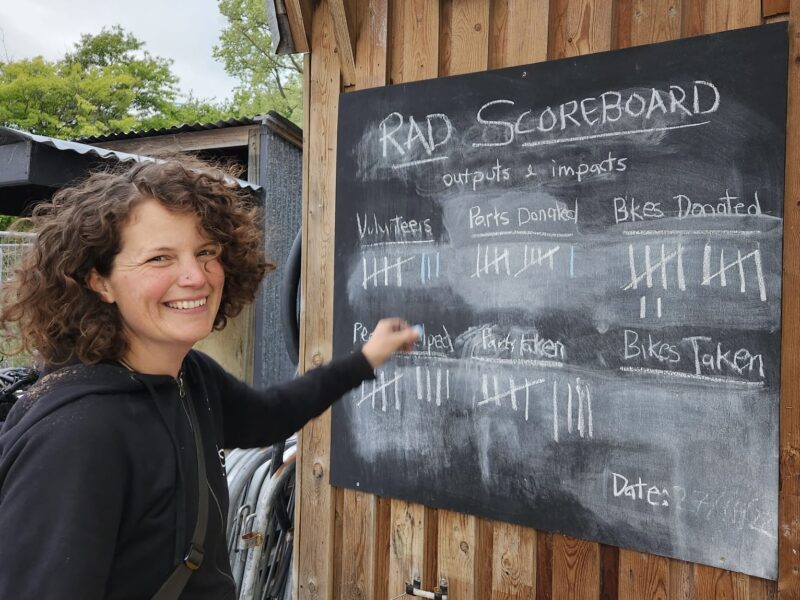
In the beginning
RAD Bikes – Recycle a Dunger – was originally a Gap Filler project initiated by Jess’ brother-in-law, Richard Sewell, after the Canterbury earthquakes. He had seen community bike workshops in other places and pitched the idea of having one in Christchurch too. ICEcycles was meeting community needs in the inner city east, but Richard’s vision was for a centrally located workshop available to everyone in Christchurch and which could help to liven up the central city.
Gap Filler supported the project, and Richard roped in Jess and her husband Nic (Richard’s brother) to help build a relocatable shed out of recycled materials. Nic took responsibility for designing the shed and the technical parts of the build, and Jess took charge of organising working bees to make the shed a reality. Within a few months the shed was ready, and the project was launched at FESTA 2013 (the Festival of Transitional Architecture) over Labour Weekend. (Those who were in Christchurch at the time will remember that this was one of the first big events to really bring people back into the central city after the earthquakes.)
Richard led the project through his Gap Filler role, putting in many hours to get it off the ground. Jess and Nic became heavily invested in the project too and were keen to continue their involvement once the shed was built. Jess says they weren’t bike mechanics but loved the idea of a place where bikes and bike parts could be recycled, and people could come together and share their skills or learn how to fix up their bikes for free.
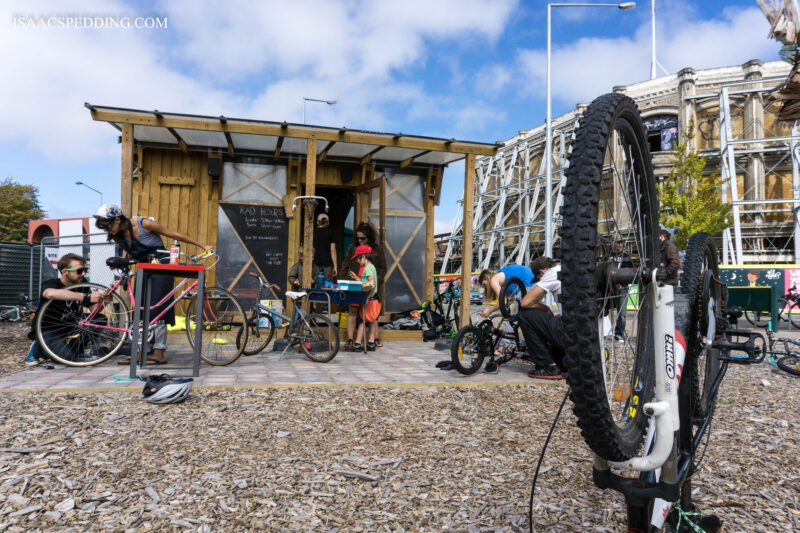
The shed was first placed near New Regent Street, in Gloucester Street, and moved around various central city locations over the first few years, before settling next to the Town Hall at the Commons. Jess says it was a matter of making things up as they went along, and there were lots of fun events in the early years, such as a cargo bike race and a bike light disco.
Initially, the workshop opened most nights, and the crew would call all their friends to encourage them to come into town. But they soon realised they were better to focus on just a couple of regular sessions each week – with more people at each session creating “more vibe” and more learning. They expected sessions would only run over the summer months, but people kept turning up – both to help and be helped – so RAD Bikes became a year-round operation.
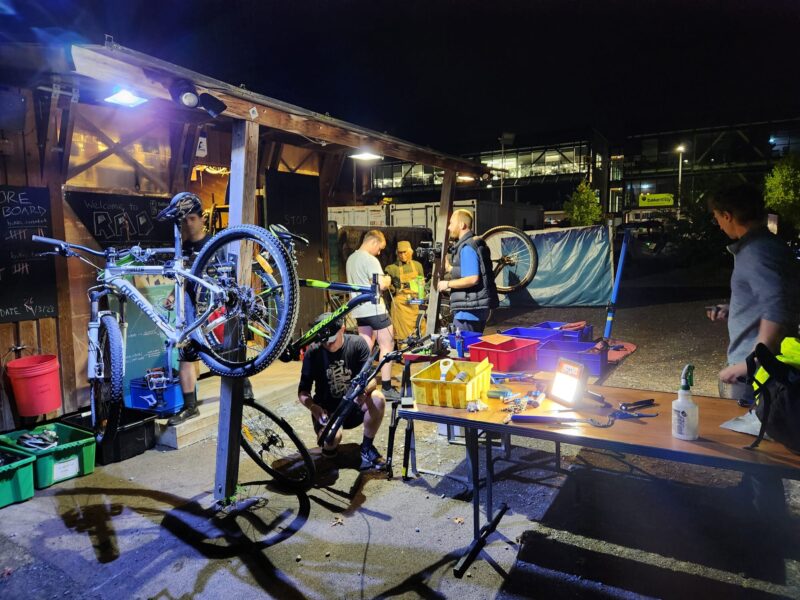
Growth and development
The success of the project led to the establishment of an independent charitable trust to run RAD Bikes in 2015. Richard moved on (to develop Space Academy) so someone else was needed to run things. As luck would have it, Jess was about to come off maternity leave and was looking to work around ten hours a week rather than return to full-time architecture. She says the coordinator role is a good fit for her – it’s purposeful, flexible, social, and makes use of her big-picture thinking and people and project management skills.
For a few years, Jess and Nic juggled care of their two young children to enable Jess to keep doing her coordinator role. It was largely a matter of keeping the RAD drop-in sessions ticking over – with Jess running the Sunday afternoon session and Nic handling things on Wednesday evenings. But when they had one child at school and the other at kindergarten, Jess had more capacity to drive and grow the initiative.
In 2020, RAD Bikes rented space off Space Academy so it could trial an expanded range of activities. With the help of bike mechanic Dave Johnson, who was already providing monthly teaching sessions to upskill the volunteers, RAD Bikes introduced mechanics courses and beginner workshops for the public, and club nights for the volunteers. Jess says the intent of club nights was to nurture the volunteers by giving them dedicated workshop time to work on their own bikes, with better access to people like Dave. She sees it as a thank you perk for volunteering, and an opportunity for the volunteers to get to know each other and become a more cohesive team.
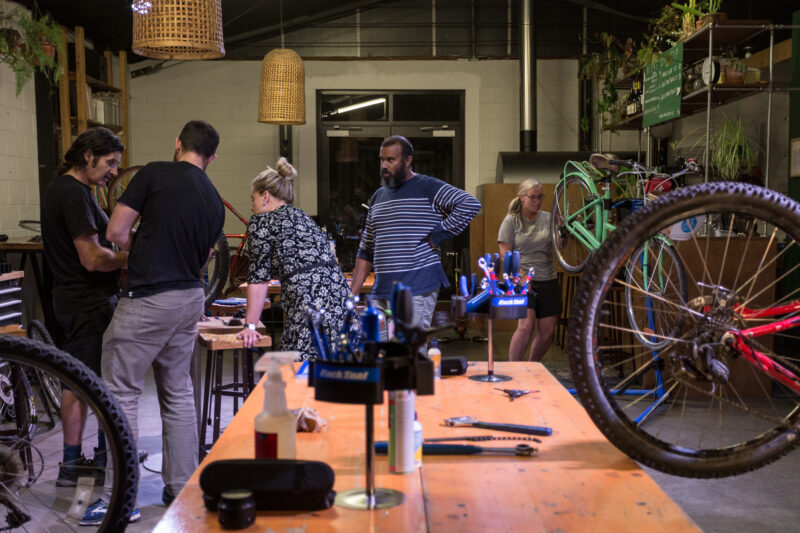
Some volunteers prefer to focus on fixing up bikes rather than working directly with the public. So, separate salvage nights and community fix-ups were set up to enable them to do just that. Salvage nights indirectly support drop-in sessions by sorting donated bikes and bike parts ready for re-use, and the community fix-ups get bikes in good working order for communities in need (such as those needing a bike to access employment). RAD Bikes supplies the fixed-up bikes to social service organisations and other community initiatives like Bike Bridge.
Jess says the second site was a great success because of Dave’s involvement and gave RAD Bikes the confidence to start looking for a permanent space in the central city. Thanks to Life in Vacant Spaces, which brokered the deal, RAD Bikes has been gifted rent-free access to new premises in Lichfield Street for 12 months (with the possibility of extensions) and moved in at the beginning of 2024. While it’s not a permanent home, it’s a fantastic space and has enabled the team to work more efficiently. Jess says moving the workshop indoors has increased both the number of volunteers (by a whopping 50 percent) and the skills they bring with them.
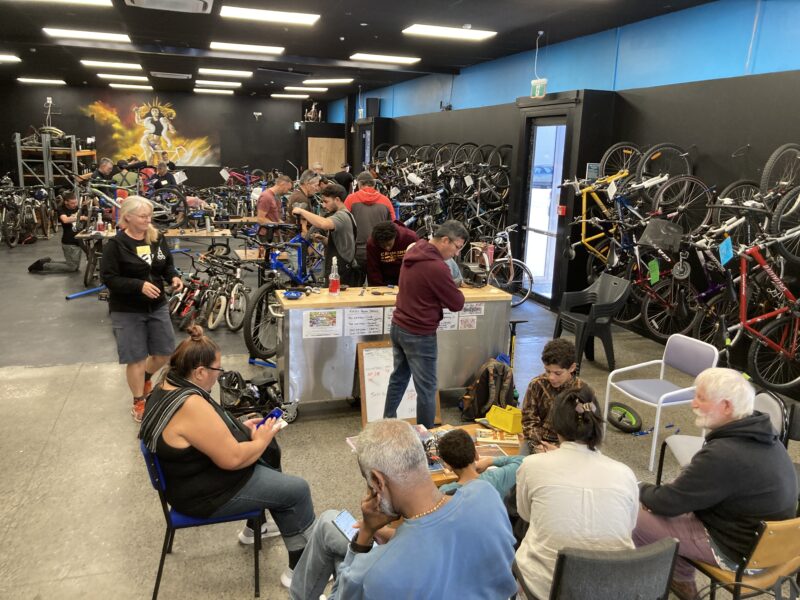
RAD Bikes today
RAD Bikes now operates solely from its new location at 160 Lichfield Street and has something happening most days of the week:
- Sunday afternoons (12-4pm) and Wednesday evenings (6.30-8.30pm) are when the drop-in sessions are held. Anyone is welcome to go along and find bike parts, use the workshop tools, and seek help in fixing their bike.
- Monday afternoon (3-6.30pm) is Find a Bike – this is your chance to purchase a low-cost recycled bike and get it back out on the road again. Many bikes have already been made roadworthy by RAD volunteers; some might require you to do a little work first.
- Monday evening (6.30pm-8.30pm) is club night. This provides the opportunity for RAD members and volunteers to learn new skills from experienced bike mechanics and work on their own projects.
- Tuesday evening (6.30pm-8.30pm) is salvage night for volunteers. The focus is on stripping, sorting and salvaging the many donated bikes and bike parts that RAD Bikes receives.
- Thursday evenings (6.30-9pm) are when the beginner workshops and mechanics courses are held. The beginner workshops are for one night (with some specifically for women), and the mechanics courses are held over eight weeks.
RAD Bikes also holds youth workshops in school holidays, monthly community fix-ups (when everyone is invited to help fix up bikes for communities) and kids fix-up days. And, during term time, RAD partners with a school to offer an eight-week bike maintenance and riding course after school hours. There’s a lot going on.
As general coordinator, Jess is responsible for overseeing RAD Bikes and keeping everything running smoothly. Jess is also part of the Board that governs the initiative. Other part-time staff include Dave Johnson, who is the mechanics teacher and workshop manager (more on Dave in an upcoming post) and is supported by a teaching assistant and workshop support. Then there’s a volunteer coordinator, a salvage squad coordinator, a special projects person, and the Bike Bridge team – coordinator Lois Hill and a cultural liaison.
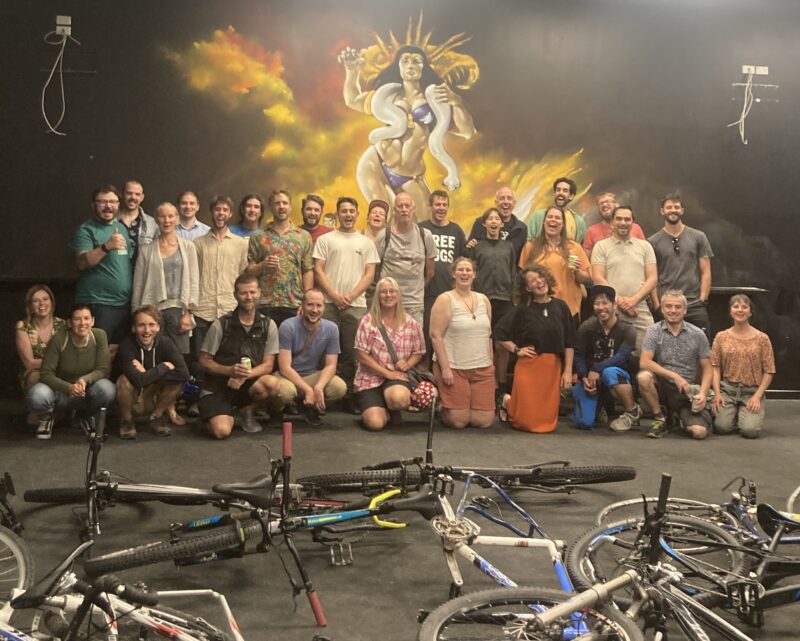
But RAD Bikes wouldn’t be RAD Bikes without the many volunteers who come along each week to share their skills and help fix up their bikes. Jess says volunteers find connection and meaning through their involvement and, for some, it can change their life – she gives the example of one volunteer overcoming difficult times and going on to pursue a career in the bike industry.
Many volunteers are from overseas and come looking for RAD bikes because they are used to similar initiatives elsewhere. Jess says it gives them a chance to meet people and contribute to the local community, as well as finding a bike to ride while they are here. And it all helps in strengthening RAD Bikes’ connections with other community bike workshops around the world.
When I visit, Jess’ children Hunter (almost 10) and Max (7) are hanging out at RAD Bikes too. Hunter was busy at work unpacking boxes of helmets donated by Lime, and Jess says he loves cycling and is keen to start fixing up bikes as well. Cycling is a way of life for their family, with Jess using her electric cargo bike to get her and the children around town, and Hunter now cycling himself to school and going mountain biking with Nic in the weekends.
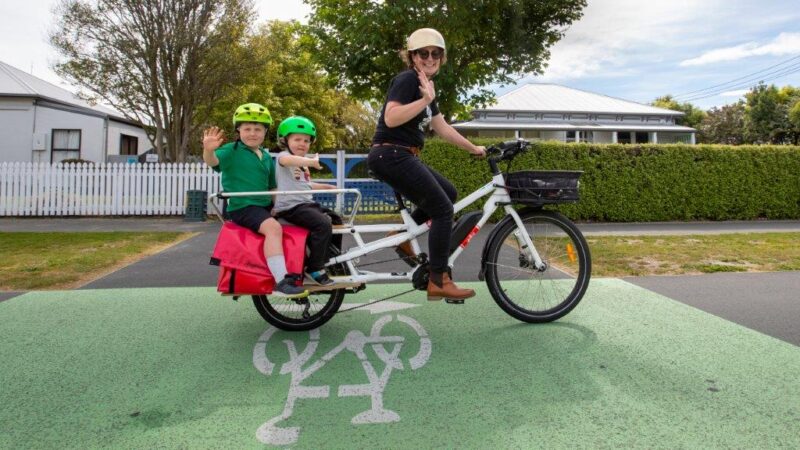
Looking to the future
Jess is positive about the future for RAD Bikes, and the impact it’s having and will continue to have. She says that now that RAD Bikes has extra capacity, they can start reaching out to communities about meeting the demand for bikes. RAD Bikes is also talking with the University of Canterbury about how it can support its Dr Bike campus fix-up, and is on the lookout for the right people to work with its afterschool programmes.
RAD Bikes is still looking for a permanent location too – so get in touch with Jess if you can help. And, if you’re interested in volunteering or donating, check out the RAD Bikes website.

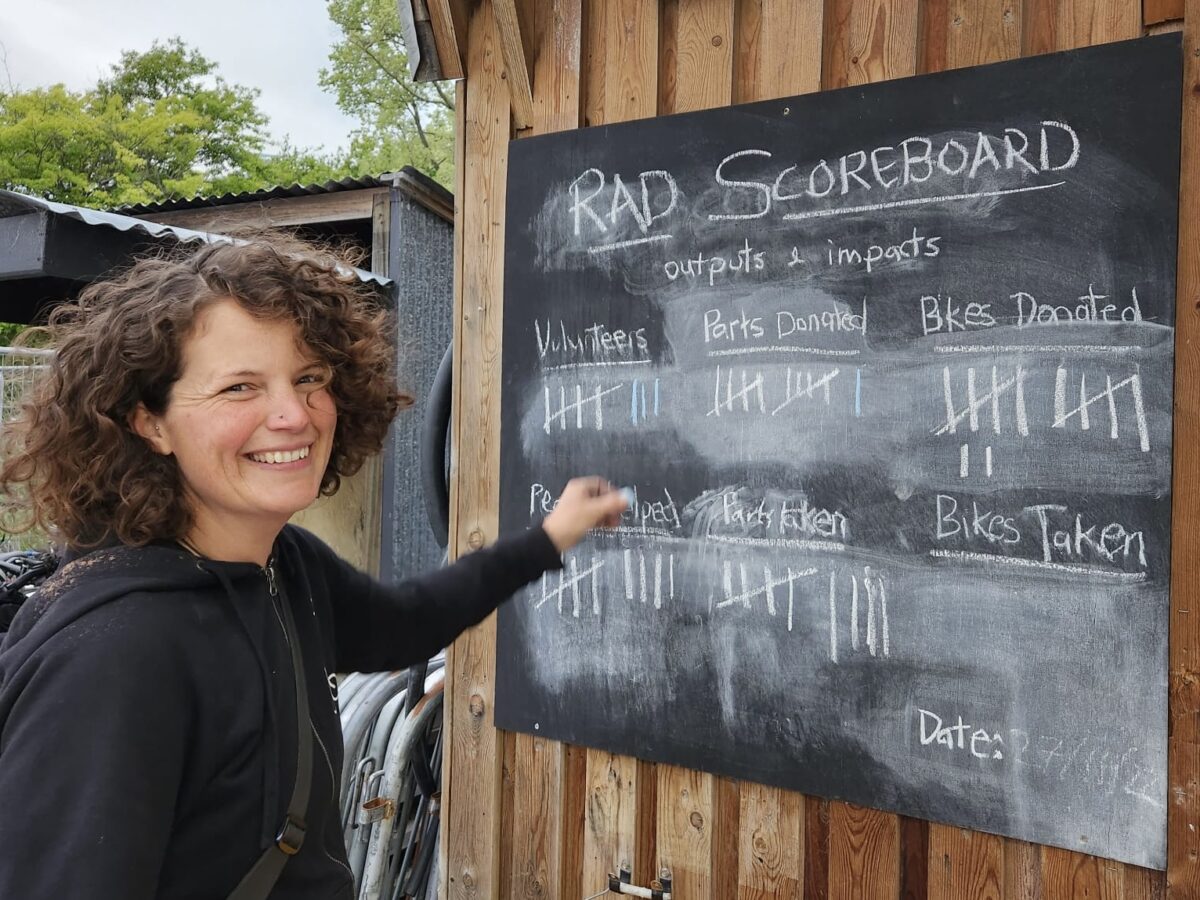
A wee addition -there is also a public Drop In session on Wednesday evenings from 6:30 to 8:30 pm.